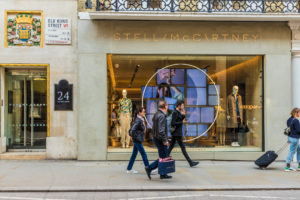
The government’s decision to scrap VAT-free shopping for tourists is costing the economy £11.1 billion in lost GDP and deterring about two million foreign visitors each year, according to an analysis by the Centre for Economics and Business Research (CEBR).
The number of tourists coming to the UK still remains around one million visitors short of pre-pandemic levels and spending by tourists in real terms has also failed to recover fully.
Rishi Sunak’s decision in 2021 to charge VAT on shopping for tourists, reversing a tax rebate that had been in place for decades and still exists in every EU country, has been highlighted by the CEBR and business leaders as a reason for the slow recovery in UK tourism.
The think tank calculated that visitor numbers would have been 589,000 higher in the third quarter of last year if a rebate scheme had been in effect and expenditure would have been about £1.3 billion higher.
Across the year, visitor numbers could have been two million higher with a £4 billion increase in spending, leading to a GDP boost of £11.1 billion and a net fiscal gain of £2.5 billion.
The research comes as more than 420 business leaders, from the chief executive of British Airways, Sean Doyle, to Gianfilippo Testa, the leader of fashion house Alexander McQueen, have called on Sunak to reinstate VAT-free shopping for tourists.
In the letter, the signatories point to research by tax-free shopping experts Global Blue, based on a sample of 11 leading retailers, showing that the post-pandemic recovery in consumer spending in Italy, Spain and France have all considerably outstripped the UK’s own recovery.
During the autumn statement in November, Jeremy Hunt, the chancellor, pledged to “look again at the numbers”, regarding VAT-free shopping, saying that the policy was changed because “we did not think we could afford to continue it”, citing a Treasury analysis that estimated the cost of the policy at £2.5 billion.
In their letter, the business leaders questioned the Treasury’s figures, labelling them “flawed and misleading” because they did not account for the money tourists spend outside retail stores, such as hotels, museums or other attractions.
Since the autumn statement the chancellor’s fiscal headroom — the amount of money the government can spend without raising the debt burden — has increased considerably. Economists estimate that even after the £20 billion in tax cuts made in November, the chancellor has anywhere between £15 billion and £20 billion to spend in March.
Hunt has given strong hints that he plans to cut taxes in the spring, telling business leaders at the World Economic Forum in Davos that the “direction of travel” indicates that economies growing faster than the UK, in North America and Asia, tend to have lower taxes.
The Treasury said: “We keep all taxes under review and recognise the value that retailers bring to Britain. That is why we announced a £4.3 billion business rates package at the autumn statement to support businesses and the high street.”
Read more:
Scrapping VAT-free shopping for tourists costs UK £11bn




